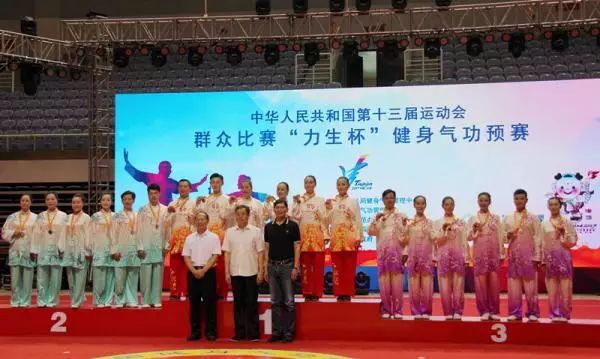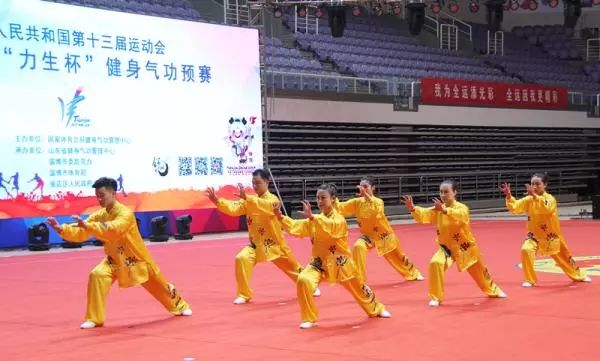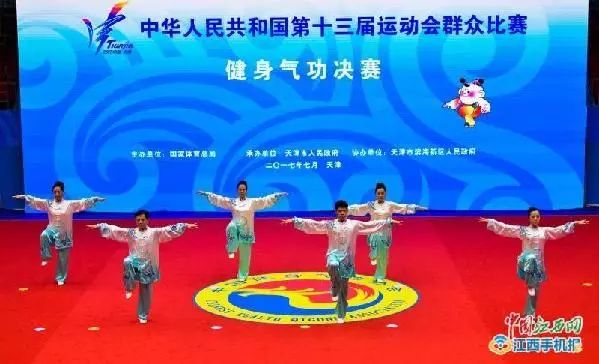Pengpai News Reporter Li Qiong from Tianjin
As a part of China’s traditional culture, fitness qigong has a history that predates Tai Chi. However, this is the first time fitness qigong has been included as a competitive sport in the National Games.
This year’s National Games features a total of 6 gold medals in fitness qigong, including techniques such as Yi Jin Jing (Muscle-Tendon Change Classic), Wu Qin Xi (Five Animal Frolics), Liu Zi Jue (Six Sounds), Ba Duan Jin (Eight Pieces of Brocade), and Qi Wu (Qigong Dance). The competitors are all skilled practitioners selected from various professions.
Mr. Song, a 55-year-old mathematics teacher, is one of these experts. He told Pengpai News that he has been practicing fitness qigong for over 8 years and firmly believes in its health benefits.
“If it weren’t beneficial, I wouldn’t have been able to stick with it for so many years,” Mr. Song confidently stated. “It helps with stretching ligaments and improving joint flexibility, and its movements are symmetrical, allowing every joint in the body to be engaged.”

Preliminary competition of fitness qigong at the National Games.
Who Says Math Teachers Aren’t Good at Sports
This year, fitness qigong was included for the first time in the mass competition at the Tianjin National Games. According to the organizing committee, there are 6 gold medals available, with 16 teams and 96 athletes participating.
Most of these competitors were selected from fitness qigong stations across various provinces and cities, and they come from diverse professional backgrounds. Among the participants representing the Shanghai team in the Wu Qin Xi group competition is Mr. Song, a mathematics teacher from a middle school in Songjiang District.
“I initially practiced Tai Chi at the station, and later when they promoted fitness qigong, I followed along. They felt I was doing well enough to compete,” Mr. Song recalled, holding his performance outfit after just finishing a demonstration.
Mr. Song mentioned that due to his busy work schedule, he usually practices fitness qigong on weekends. “On weekend mornings, I typically practice for about two hours, and if I have time during the weekdays, I occasionally find a place to practice a move or two.”
However, to prepare for the Tianjin National Games, Mr. Song had to take leave from school. “At first, I only practiced on weekends, sometimes taking half a day off to train with everyone, but after the closed training, I had to request a long leave and have someone else cover my classes.”
During the competition on the afternoon of July 9, the Shanghai team performed fifth, with five members completing a set of Wu Qin Xi to the accompaniment of traditional folk music. The judges awarded them a score of 9, placing them seventh among all participating teams. A touching moment occurred during the competition when a female team member from Shanghai, despite suffering from a back injury, insisted on completing the performance. Afterward, she held her back with a pained expression, “That was an old injury; it might have flared up due to the increased training volume,” Mr. Song explained.
“I think they performed excellently!” After the competition, team leader Fan Benhao expressed to Pengpai News, “Our athletes worked very hard, truly embodying the spirit of national fitness and health.”

Fitness Qigong Cured My Modern Ailments
Mr. Song, now 55, admits that as he ages, his body is gradually deteriorating. “Especially my balance, joints, and ligaments are degrading, so I feel less agile when performing movements than before.”
“I used to love sports, playing basketball, volleyball, and soccer, but I felt less nimble over time, so I started practicing Tai Chi and fitness qigong.”
“Fitness qigong is very helpful for stretching ligaments and improving joint flexibility, and its movements are symmetrical, allowing every joint in the body to be engaged,” Mr. Song analyzed to Pengpai News.
Through personal experience, Mr. Song has also found that fitness qigong significantly alleviates modern ailments. “It is excellent for spinal health; issues with the neck, shoulders, and lumbar spine are modern diseases, and fitness qigong provides great relief for these.”
“Sitting in the office for long periods, reading, and grading papers can be very uncomfortable. I use a movement to practice, and my body relaxes immediately,” Mr. Song demonstrated, standing straight.
Now, more and more friends around him are practicing fitness qigong, which Mr. Song sees as a positive development. “Any sport that lacks public participation will not last long.”
According to Chang Jianping, director of the National Fitness Qigong Center, the number of people practicing fitness qigong in China has increased from over 1 million to 4.5 million. In the three years since the International Qigong Federation was established, the number of member associations has grown from 54 to 87.
Team leader Fan believes that fitness qigong is particularly suitable for mass promotion. “It requires little space and has excellent health benefits, making it a very worthwhile public fitness activity.”
“We treat weekend fitness as a party, where everyone meets up, chats, and exercises, which is a great way to combine both,” Mr. Song said.

The Jiangxi team competing in the fitness qigong Wu Qin Xi group competition.
Eliminating Misunderstandings: Its Purpose is Fitness
In an interview, Chang Jianping stated that as a part of traditional Chinese culture, qigong is neither a religious superstition nor a mysterious art, but a means of pursuing harmony between body and mind through fitness.
Mr. Song believes there are some misunderstandings about qigong among the public. “This is mainly due to the proliferation of misleading practices in recent years, which have made it seem esoteric and unexplainable by science, leading to confusion and misconceptions.”
To better inherit and develop traditional Chinese culture, the China Fitness Qigong Association has created new forms of fitness qigong based on traditional practices, including Yi Jin Jing, Wu Qin Xi, Liu Zi Jue, Ba Duan Jin, Tai Chi Health Stick, Daoyin Health Exercises, Twelve Sections of Jin, Mawangdui Daoyin, and Da Wu.
“This sport has a very positive impact on public health, and it aligns with TCM principles, organically combining the essence of Confucianism, Taoism, and Buddhism with physical exercise,” team leader Fan told Pengpai News.
“Qigong’s history is even longer than that of Tai Chi; however, it has undergone transformations and merged with movements from Tai Chi and other martial arts, and it is possible that Tai Chi itself borrowed some movements from fitness qigong.”
“Tai Chi is ultimately a martial art, primarily focused on combat, while fitness qigong emphasizes the twisting of joints and stretching of ligaments.”
“It was created for fitness, so the health benefits of Tai Chi may not be as effective as those of fitness qigong.”
Is Fitness Qigong Suitable for Competition?
Although including fitness qigong in this year’s National Games is an innovation and attempt, team leader Fan believes that whether competition can objectively and fairly reflect the athletes’ abilities is still debatable.
Team leader Fan believes that mass competitions may be better suited to demonstration and display formats, while ranking in competitive mass events may not necessarily be beneficial. “Our ultimate goal is to promote public health and get people moving.”
Regarding how to conduct competitions in mass sports, Fan also provided his suggestions. “Actually, we could use a standard system to allow the public to reach a certain level, which might be more conducive to the promotion and development of public sports and events.”
This issue was edited by Xing Tan.
Recommended Reading
Is it worth trading a leg for a life?
The Long March 5 Yao-2 rocket flight encountered anomalies, resulting in a failed launch mission.
An elderly woman wore 9 rings on one hand, 7 of which got stuck, and one embedded in her flesh… it looked painful.
Can graduates from Maotai College directly enter the Maotai Group?

